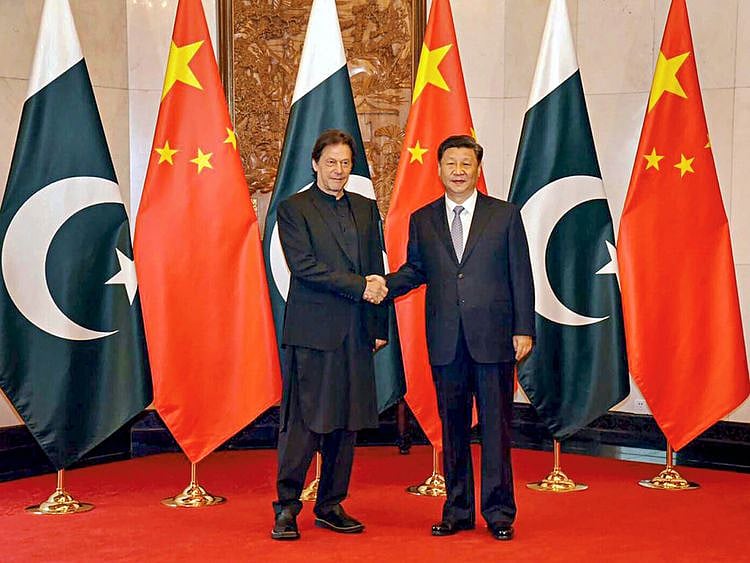Success on the foreign front alone not enough to boost Pakistan
Imran’s visit to China is key in securing Pakistan’s interests, but more needs to be done

Pakistan’s Prime Minister Imran Khan, along with the country’s army chief General Qamar Javed Bajwa, arrived in Beijing last week to reinforce close ties between the two allies.
Coming at a time when the nation’s internal outlook appears weak to say the least, there couldn’t have been a more opportune moment for Pakistan’s top civil and military leaders to consult with the top leaders of a country that not only remains one of the world’s most successful cases of an economic turnaround. More vitally, China continues to be the most loyal friend of Pakistan, which has never let down Islamabad in times of need.
The visit will likely prove its success if indeed Pakistan can step up the pace of execution surrounding projects under the China Pakistan Economic Corridor or CPEC.
The corridor remains the single significant initiative under Chinese President Xi Jinping’s Belt and Road Initiative (BRI).
Meanwhile, consultations between military leaders from the two countries are essential to press ahead with a commonality of views on mutual interests. In the past two months since Pakistan has been locked in its latest disagreement with India since Indian Prime Minister Narendra Modi’s government ended a special status for the state of Kashmir, China and Pakistan have remained in close consultations on how best to respond to this latest challenge.
Aside from an increasing role in Pakistan’s economic future, China has also become a vital stakeholder in lifting the country’s military preparedness. All three of Pakistan’s forces (Army, Navy and Air Force) now rely principally on China’s vital assistance to maintain a credible military deterrence against India. This combined with Pakistan’s nuclear arms ability provides the basis for Pakistan to deter a future aggression.
Gaps that have held back progress
And yet, notwithstanding these essential contributions by China in helping Pakistan maintain a credible defence, Pakistan’s multiple challenges eventually hinge on the country’s internal shortcomings on different fronts.
In the past year, Imran’s government has sought to lay a basis for a new economic future amid promises of overseeing vital new reforms. But such promises continue to be surrounded with gaps that have eventually held back progress. The recent meetings of some of Pakistan’s top leaders with General Bajwa and Prime Minister Imran not only highlighted lingering issues waiting to be resolved. Coming more than a year after the government came to office, the gatherings also raised a pertinent question; exactly why did the government wait this long for what was after all a long overdue consultation.
Also Read
The contrasting faces of PakistanPakistan, India should move beyond disputesPakistan should work to bridge the rich-poor dividePakistan needs to honour its iconsOpposition unity in Pakistan is a mirageMeanwhile, key sectors of Pakistan’s economy notably agriculture which directly or indirectly remains the main source of income for up to half of the population, sees lip service with little reformist action. Other areas of the economy including the industrial sector and different sectors of business also remain under stress. The government’s standard answer remains that this is all to do with constraints tied to a new IMF loan which will eventually fade away in a few years. But that’s over simplifying the challenge. Pakistan for long has suffered the consequences of an eroding structure of government that has weakened the ability of the Pakistani state to deliver essential services. In some areas, the problem has been amplified due to either out of date policies or simply inadequate ones. Nothing can highlight this trend more powerfully than the reality of gaps in the agriculture sector, where presentations on paper in higher policy circles just don’t jell with reality on the ground.
Meanwhile, across Punjab — Pakistan’s largest and most populated province which is home to about 60 per cent of its people, Chief Minister Usman Buzdar faces mounting criticism for his government’s failure to address key areas. However, within the province, individuals like Yawar Bukhari, a young member of the provincial legislature who is also chairman of the provinces’ public accounts committee, is trying to make a difference. He has presided over a series of meetings of his committee to assess conditions across areas of central importance that make a difference to the lives of people across the board. Going forward, Imran needs to pick such areas presenting promise to refine them further while addressing gaps in other areas too. Last week’s visit to China may have been central to securing Pakistan’s significant interests. But without tackling challenges internal to Pakistan, success on the foreign front alone will not be sufficient to raise Pakistan’s future outlook.
— Farhan Bokhari is a Pakistan-based commentator who writes on political and economic matters. Email: fbokhari@gulfnews.com
Sign up for the Daily Briefing
Get the latest news and updates straight to your inbox
Network Links
GN StoreDownload our app
© Al Nisr Publishing LLC 2026. All rights reserved.